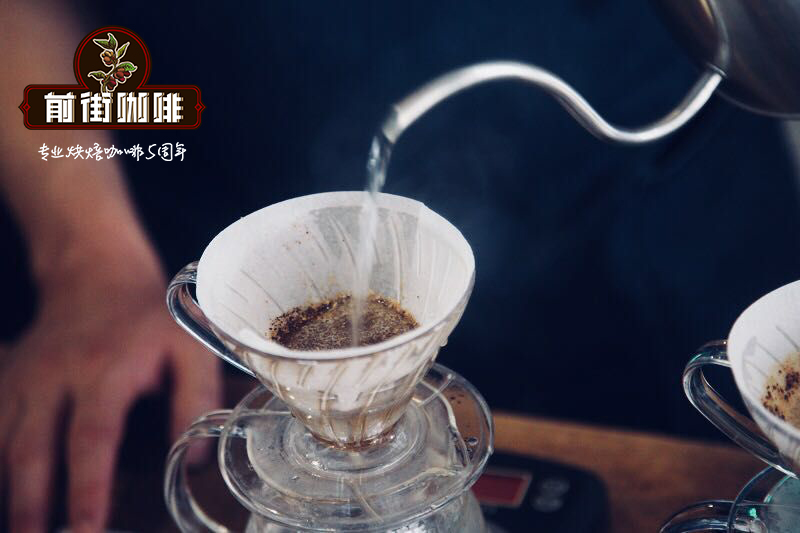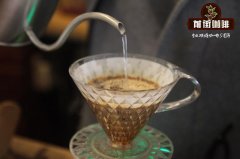The effect of water quality on coffee can water quality also affect the flavor of coffee?

Professional coffee knowledge exchange more coffee bean information please follow the coffee workshop (Wechat official account cafe_style)
Although bean selection, roasting, grinding, water temperature and brewing techniques are all in place, ignoring 98% of the substance in a cup of coffee, the desire for the ultimate flavor is ultimately difficult to meet.
High quality water consumption
The ingredients of a cup of coffee are mostly water.
About 98% of the coffee prepared by general brewing method is moisture.
In the case of espresso, it's about 90% water. Therefore, if you want to make quality coffee, it is common sense to use high-quality water.
Then what kind of water is good water? First of all, it must be odorless or tasteless, and it must not have color or other impurities visible to the naked eye. In addition, its pH should be between 7 and 8 and should not contain chlorine.
A little deeper, the total dissolved concentration (TDS) of water should be about 150mg / L, including about 55mg / L of calcium hardness.
When the TDS value is too high, the solubility of that water will not extract coffee efficiently, and the brewed coffee will feel underextracted, but on the contrary, if the TDS is too low, for example, if you use pure water with a TDs of 0, the resulting coffee is easy to have a bitter taste.
Water experts who have been engaged in coffee and water research for many years and served as judges of several Korean World Coffee competitions & Golden Coffee Award tell you how water quality affects the aroma and taste of coffee.
Water can screen out good aroma components and awaken coffee flavor.
The strongest parts of the aroma will be extracted at the beginning, and as the coffee particles come into contact with water for longer and longer, bitter, bad-flavor substances will be gradually released.
The ideal TDs value can show the flavor of coffee.
Scientific experiments have confirmed that minerals (calcium, magnesium, potassium, sodium) and trace elements in water can change the sensory properties of coffee. The right amount of minerals will help to improve the flavor, aroma, taste, sweetness, mellow, aftertaste, etc.; excessive will change the taste of coffee, making it strongly sour and astringent.
Effect of Ions in Water on extraction of Flavor substances
There are seven ingredients in coffee beans, including lactic acid, malic acid, citric acid, quinic acid, chlorogenic acid, caffeine, and eugenol, which plays the role of fragrance. The combination of cations (magnesium and calcium) dissolved in water will improve the extraction rate of aroma components and affect the final flavor of coffee.
Using Water Taste Map to analyze different Water quality
Water is tasteful. in the book, the sensory characteristics of ideal water quality, high TDS value water, high pH value water and salty water (or salt water), such as aroma, acidity, sweetness, bitterness, pure thickness, and metallic taste, are presented in a water taste diagram, mastering the performance and characteristics of water, you can highlight the level of coffee.
END
Important Notice :
前街咖啡 FrontStreet Coffee has moved to new addredd:
FrontStreet Coffee Address: 315,Donghua East Road,GuangZhou
Tel:020 38364473
- Prev

Robusta coffee is not good? what are the characteristics of robusta coffee?
Professional coffee knowledge exchange more coffee bean information please pay attention to the coffee workshop (Wechat official account cafe_style) Robstado grows in the lowland 200600 meters above sea level, likes the warm climate, requires a temperature of 2429 ℃, and does not require high rainfall, but there is a point that this variety depends on insects or wind to pollinate, so it takes 911 months from pollination to fruit.
- Next

The extraction principle of espresso: how much coffee is the ratio of water to powder and how to brew espresso beans
Professional coffee knowledge exchange more information about coffee beans Please follow the coffee workshop (Wechat official account cafe_style) the ratio of powder to water is simply how much coffee beans and water you use to brew coffee. The unit of measurement is more than how many grams of coffee versus how many milliliters of water. In the general environment of brewing coffee, we will regard grams and milliliters as the same. So, for example,
Related
- Beginners will see the "Coffee pull flower" guide!
- What is the difference between ice blog purified milk and ordinary milk coffee?
- Why is the Philippines the largest producer of crops in Liberia?
- For coffee extraction, should the fine powder be retained?
- How does extracted espresso fill pressed powder? How much strength does it take to press the powder?
- How to make jasmine cold extract coffee? Is the jasmine + latte good?
- Will this little toy really make the coffee taste better? How does Lily Drip affect coffee extraction?
- Will the action of slapping the filter cup also affect coffee extraction?
- What's the difference between powder-to-water ratio and powder-to-liquid ratio?
- What is the Ethiopian local species? What does it have to do with Heirloom native species?

